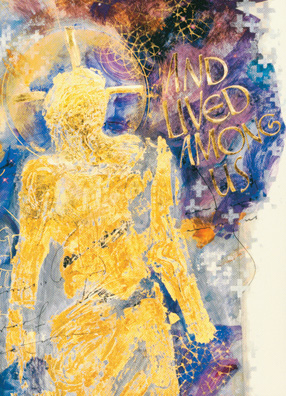Jeremiah 3131-34
Psalm 51
Hebrews 5:7-9
John 12:20-33
It is a constant struggle to write about Scripture and morality without coming across as “preachy” or moralistic; and yet at the same time there is a beautiful way to witness to the truth of Revelation through both the mundane and profound choices that one makes day in and day out in the Christian life, and the Christian intellectual and moral tradition can be one aid to living a life of love motivated by God’s grace. This week’s readings highlight this reality in a striking manner.
With just a little reflection, it becomes possible to see how these readings point to the unity of the natural law and Revelation, especially as these are unified and exemplified in the Person of Jesus Christ. The first reading from Jeremiah points to both of these realities:
I will make a new covenant with the house of Israel and the house of Judah. It will not be like the covenant I made with their fathers…I will place my law within them and write it upon their hearts.
Both of these lines resonate with realities described in the New Testament: (1) Jesus initiates his disciples into a new covenant of love in John 13; and (2) Paul writes in Romans 2:14 that “when Gentiles [i.e., non-Jews], who do not possess the law, do instinctively what the law requires, these, though not having the law, are a law unto themselves.” The Catholic intellectual and moral tradition has long upheld that because all persons are possessed of equal dignity as made in the image and likeness of God, and therefore through the use of reason and free will are capable of knowing the natural law in our consciences, all persons are endowed with the capacity to know and do what is right, good, and just. Furthermore, as Pope Benedict XVI repeatedly writes, Scripture (and the example of Christ) can help to “purify” human reason, revealing a higher and more perfect way to follow and to know God and to put this into action. What I find so beautiful about this tradition is that reason, Revelation, and human experience (in all of its forms) is affirmed, strengthened, and elevated in the light of God’s grace.
OK, so we can see that natural law and Revelation are not incompatible, but so what? To what end? The Gospel of John provides a perfect answer:
‘Father, glorify your name.’
Then a voice came from heaven,
‘I have glorified it and will glorify it again.’
The purpose of God’s gifts of freedom, wisdom, and grace is to glorify God’s name. The very purpose of human free action is to give glory to God and witness to the beauty of the natural law and of the example given to us by the Christ. The height of such witness is found in martyrdom, the willingness to glorify God’s name by sacrificing one’s life. I am reminded here of the voices of two great Christian thinkers who can sum this up better than I, and it is with their words that I end this reflection:
Martyrdom, accepted as an affirmation of the inviolability of the moral order, bears splendid witness both to the holiness of God’s law and to the inviolability of the personal dignity of man, created in God’s image and likeness.
– John Paul II, Veritatis Splendor, 92.
Preach the Gospel always; when necessary, use words.
– St. Frances of Assissi



